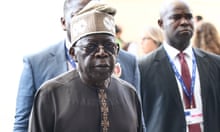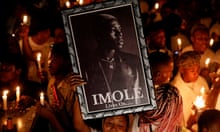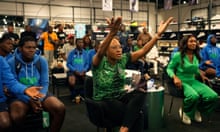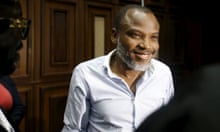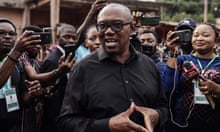Nigeria’s government has suspended Twitter access in the country, with major telecoms networks appearing to block the platform, two days after Twitter removed a post from the president, Muhammadu Buhari, that threatened to punish secessionists.
The information minister, Lai Mohammed, announced that Twitter access was indefinitely suspended on Friday and said the government had acted because of “the persistent use of the platform for activities that are capable of undermining Nigeria’s corporate existence”.
A spokesperson for the president declined to comment and Mohammed did not spell out what form the suspension would take or give more details on the undermining activities. The move sparked mass outrage in Nigeria and is widely seen to be a response to Twitter removing the president’s tweet.
Twitter said the post violated its policy on abusive behaviour. In the post, Buhari promised to punish pro-Biafra groups blamed for several attacks against government agencies and security forces this year.
“Many of those misbehaving today are too young to be aware of the destruction and loss of lives that occurred during the Biafra war,” Buhari wrote. “Those of us in the fields for 30 months, who went through the war, will treat them in the language they understand,” referencing his role as a brigade major during the Biafra war, one of the darkest chapters in Nigeria’s history. The war ended the attempts by mainly Igbo people in south-east Nigeria to create an independent nation of Biafra.
On Saturday, Twitter was inaccessible through mobile apps on many of the largest phone networks, including the biggest one, South Africa’s MTN. Many users expressed outrage, and some managed to access the social media platform through virtual private networks.
Twitter said on Friday it was investigating the “deeply concerning” suspension of operations, and would “provide updates when we know more”. The company is not known to have registered offices in Nigeria; it set up its first Africa-based operations in Ghana in April.
Outrage at the ban erupted in Nigeria on Friday night, with many describing it as an attempt to censor citizens and clamp down on dissent, after several users reported the president’s tweet on Wednesday.
Osai Ojigho, the director of Amnesty International in Nigeria, condemned the ban, saying Twitter was “widely used by Nigerians to exercise their human rights including their rights to freedom of expression and access to information”. She said: “We call on the Nigerian authorities to immediately reverse the unlawful suspension and other plans to gag the media, repress civic space, and undermine Nigerians’ human rights.”
The president’s most virulent comments threatening pro-Biafra groups sent shockwaves through Nigeria, particularly in the south-east where the bitter legacy of the war is still raw. Millions died of hunger following a government blockade during the war. Deaths from the conflict are not commemorated in Nigeria, and cultural depictions are censored.
Calls by government officials and lawmakers to regulate and restrict social media use have grown in recent years, particularly in response to “end Sars” protests against police brutality which erupted across Nigerian cities last October. The protests were brutally clamped down on by Nigerian police and military, with several protesters gunned down including at least 12 people at the Lekki Tollgate area.
Demonstrators had used social media to organise, raise money and share footage of alleged abuses. Twitter’s CEO, Jack Dorsey, tweeted to encourage his followers to donate to the protesters raising funds. Following the protests, Mohammed called for “some form of regulation” on social media to combat “fake news”.
A bill being considered by lawmakers, promising to regulate social media including by punishing “false statements” and enabling the government to shut down the internet, has been widely condemned.

